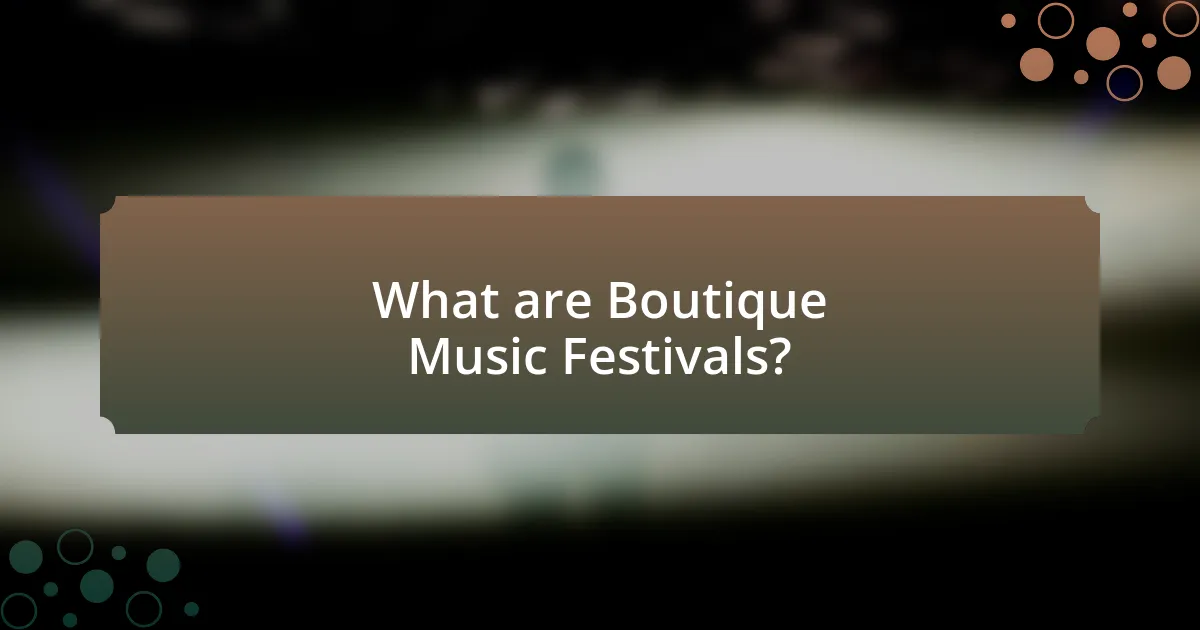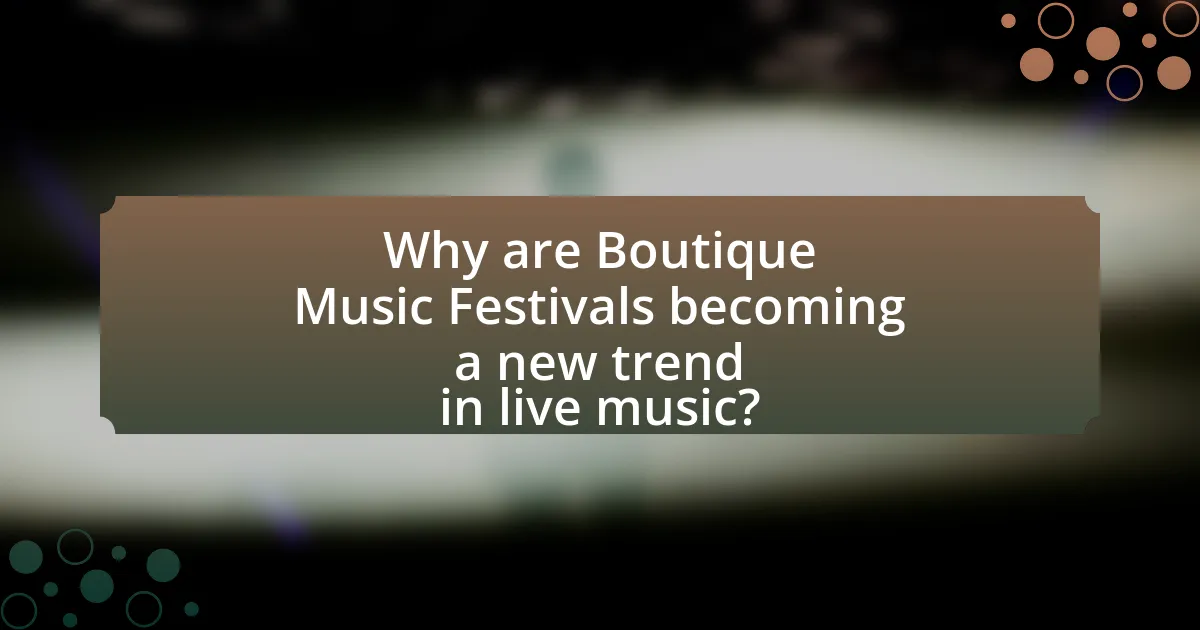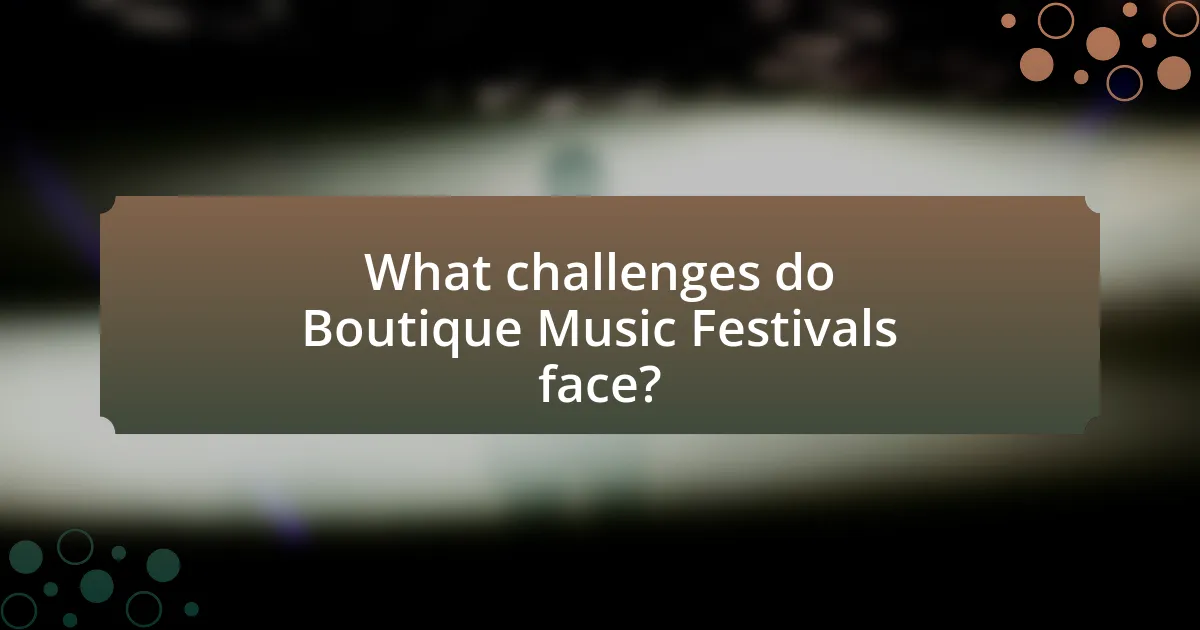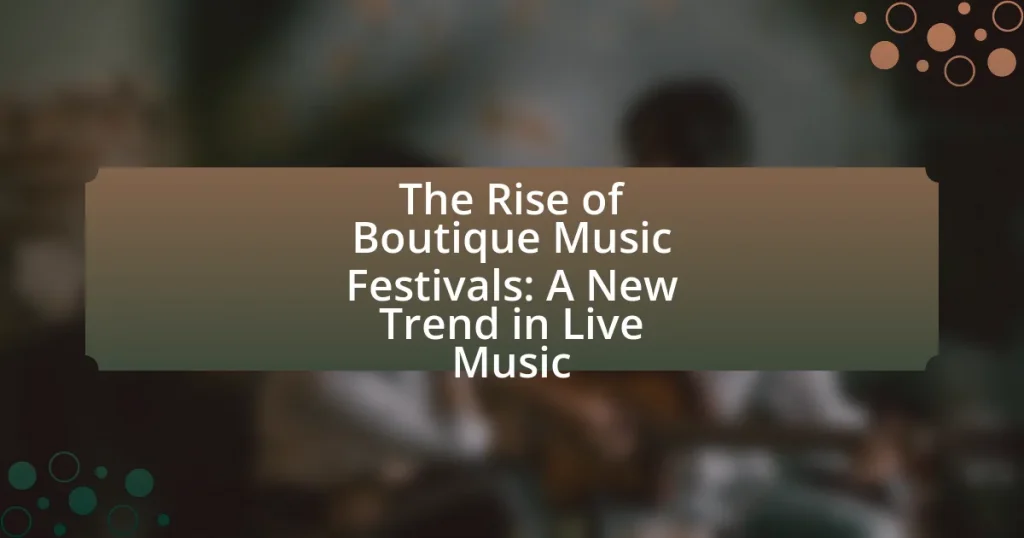Boutique music festivals are small-scale, curated events that prioritize intimate experiences, quality performances, and community engagement. This article explores the defining characteristics of boutique festivals, highlighting their differences from traditional music festivals, such as smaller capacities and unique amenities. It examines the factors contributing to their rise, including consumer demand for personalized experiences and the role of social media in promoting these events. Additionally, the article discusses the economic impact of boutique festivals on local communities, the challenges they face, and best practices for attendees to enhance their experience.

What are Boutique Music Festivals?
Boutique music festivals are small-scale, curated events that focus on providing a unique and intimate experience for attendees, often featuring a selective lineup of artists and a strong emphasis on atmosphere and community. These festivals typically prioritize quality over quantity, showcasing a limited number of performances in picturesque settings, which enhances the overall experience. The trend towards boutique music festivals has grown significantly, with events like Coachella’s VIP section and smaller festivals such as Desert Daze and Shambhala Music Festival exemplifying this shift, catering to audiences seeking personalized and immersive musical experiences.
How do Boutique Music Festivals differ from traditional music festivals?
Boutique music festivals differ from traditional music festivals primarily in their scale, experience, and audience engagement. Boutique festivals are typically smaller, often featuring a curated lineup of artists that emphasizes quality over quantity, which allows for a more intimate atmosphere. For example, while traditional festivals like Coachella host hundreds of thousands of attendees and numerous acts across multiple stages, boutique festivals may cater to a few thousand attendees with a focused selection of performers, enhancing personal connections between artists and fans. This intimate setting often includes unique amenities, such as gourmet food options and art installations, which further distinguish them from the more commercialized and larger traditional festivals.
What unique features define a Boutique Music Festival?
Boutique music festivals are characterized by their intimate scale, unique themes, and curated lineups that emphasize quality over quantity. These festivals typically feature a limited number of attendees, often ranging from a few hundred to a few thousand, which fosters a close-knit community atmosphere. Additionally, they often incorporate distinctive artistic elements, such as immersive installations and local cultural influences, enhancing the overall experience. The focus on niche genres and emerging artists further differentiates boutique festivals from larger mainstream events, allowing for a more personalized and engaging musical journey.
Why are smaller capacities significant for Boutique Music Festivals?
Smaller capacities are significant for Boutique Music Festivals because they create an intimate atmosphere that enhances the overall experience for attendees. This intimacy allows for closer interactions between artists and fans, fostering a sense of community and connection that larger festivals often lack. Additionally, smaller capacities enable organizers to curate a more diverse lineup of artists, focusing on quality over quantity, which can lead to unique performances and memorable moments. According to a study by the Event Marketing Institute, 78% of festival-goers prefer smaller events for their personalized experiences, highlighting the demand for such formats in the live music scene.
What factors contribute to the rise of Boutique Music Festivals?
The rise of boutique music festivals is primarily driven by the demand for unique and immersive experiences among festival-goers. This trend is supported by a growing consumer preference for smaller, curated events that offer personalized interactions with artists and a more intimate atmosphere. According to a report by Eventbrite, 78% of millennials prefer experiences over material goods, highlighting the shift towards experiential consumption. Additionally, boutique festivals often emphasize local culture, sustainability, and community engagement, which resonate with audiences seeking meaningful connections. The combination of these factors has led to an increase in the popularity and prevalence of boutique music festivals in recent years.
How has consumer demand influenced the growth of Boutique Music Festivals?
Consumer demand has significantly influenced the growth of boutique music festivals by driving the desire for unique, immersive experiences over traditional large-scale events. As audiences increasingly seek personalized and intimate settings, boutique festivals have emerged to cater to this preference, often featuring curated lineups, local food and art, and a strong sense of community. According to a report by Eventbrite, 78% of millennials prefer experiences over material goods, highlighting a shift in consumer behavior that favors smaller, more engaging events. This demand for tailored experiences has led to a rise in boutique festivals, which often sell out quickly, demonstrating their popularity and the effectiveness of their targeted marketing strategies.
What role does social media play in promoting Boutique Music Festivals?
Social media plays a crucial role in promoting boutique music festivals by providing a platform for targeted marketing and community engagement. Through platforms like Instagram, Facebook, and Twitter, festival organizers can reach specific demographics, share engaging content, and create a sense of community among attendees. For instance, a study by Eventbrite found that 80% of festival-goers discover events through social media, highlighting its effectiveness in reaching potential attendees. Additionally, social media allows for real-time updates and interactions, enhancing the overall festival experience and encouraging word-of-mouth promotion, which is vital for the success of boutique festivals.

Why are Boutique Music Festivals becoming a new trend in live music?
Boutique music festivals are becoming a new trend in live music due to their unique, immersive experiences that cater to niche audiences. These festivals often emphasize quality over quantity, featuring carefully curated lineups, intimate settings, and personalized interactions with artists. For instance, events like the Desert Daze Festival in California focus on a specific genre and create a distinct atmosphere that attracts dedicated fans. Additionally, the rise of social media has amplified the visibility of these festivals, allowing them to reach targeted demographics effectively. According to a report by Eventbrite, 70% of festival-goers prefer smaller, boutique festivals for their community feel and unique offerings, highlighting a shift in consumer preferences towards more personalized experiences in live music.
What experiences do attendees seek at Boutique Music Festivals?
Attendees at boutique music festivals seek immersive and unique experiences that differentiate them from larger mainstream events. These experiences often include intimate performances by artists, opportunities for personal interaction with musicians, and a curated atmosphere that emphasizes community and connection. According to a study by the Event Marketing Institute, 78% of festival-goers prioritize the overall experience over the lineup of artists, highlighting the importance of ambiance, art installations, and interactive activities. Additionally, boutique festivals often focus on sustainability and local culture, which appeals to attendees looking for meaningful engagement and a sense of belonging.
How do Boutique Music Festivals enhance the overall attendee experience?
Boutique music festivals enhance the overall attendee experience by offering a more intimate and personalized atmosphere compared to larger festivals. These events typically feature a smaller number of attendees, which fosters a sense of community and connection among participants. Additionally, boutique festivals often curate unique lineups that emphasize emerging artists and diverse genres, allowing attendees to discover new music in a more engaging setting.
Furthermore, the attention to detail in aspects such as venue selection, food and beverage offerings, and interactive experiences contributes to a higher quality experience. For instance, many boutique festivals prioritize local vendors and sustainable practices, which not only supports the community but also aligns with the values of many attendees. This combination of intimacy, curated content, and quality amenities creates a memorable experience that resonates with festival-goers.
What types of activities and amenities are commonly found at Boutique Music Festivals?
Boutique music festivals commonly feature a variety of activities and amenities designed to enhance the attendee experience. These festivals often include intimate live performances by emerging and established artists, interactive art installations, wellness activities such as yoga and meditation sessions, and gourmet food options from local vendors. Additionally, boutique festivals frequently offer unique workshops, craft markets, and themed lounges that encourage social interaction and community building. The focus on quality over quantity in both the lineup and the overall experience distinguishes boutique festivals from larger, mainstream events.
How do Boutique Music Festivals impact local economies?
Boutique music festivals significantly boost local economies by increasing tourism, generating revenue, and creating jobs. These festivals attract attendees who spend money on accommodations, food, and local attractions, leading to a direct economic impact. For instance, a study by the National Endowment for the Arts found that music festivals can generate millions in local spending; for example, the Coachella Valley Music and Arts Festival contributed approximately $403 million to the local economy in 2017. Additionally, boutique festivals often employ local vendors and staff, further enhancing economic benefits. This multifaceted impact illustrates how boutique music festivals serve as catalysts for economic growth in their host communities.
What economic benefits do Boutique Music Festivals bring to host communities?
Boutique music festivals provide significant economic benefits to host communities by boosting local tourism, increasing revenue for businesses, and creating job opportunities. These festivals attract visitors who spend money on accommodations, food, and local attractions, which can lead to a substantial increase in sales for hotels, restaurants, and shops. For instance, a study by the National Endowment for the Arts found that festivals can generate millions in economic impact; for example, the Newport Folk Festival contributed approximately $10 million to the Rhode Island economy in 2019. Additionally, boutique festivals often require local staffing for security, vendors, and logistics, thereby creating temporary jobs and stimulating the local labor market.
How do local businesses benefit from Boutique Music Festivals?
Local businesses benefit from boutique music festivals through increased foot traffic, heightened visibility, and boosted sales. These festivals attract attendees who often explore nearby shops, restaurants, and services, leading to a surge in customer visits. For instance, a study by the National Endowment for the Arts found that events like music festivals can increase local business revenue by up to 30% during the event period. Additionally, local vendors often gain opportunities to showcase their products, enhancing community engagement and fostering long-term customer relationships.

What challenges do Boutique Music Festivals face?
Boutique music festivals face several challenges, including high operational costs, competition from larger festivals, and difficulties in attracting a consistent audience. High operational costs arise from the need for quality production, unique experiences, and often limited sponsorship opportunities, which can strain budgets. Competition from larger festivals, which typically have more resources and established audiences, makes it challenging for boutique festivals to secure top-tier talent and draw attendees. Additionally, attracting a consistent audience can be difficult due to the niche nature of boutique festivals, which may limit their market reach compared to mainstream events. These factors collectively impact the sustainability and growth potential of boutique music festivals.
How do logistical issues affect the planning of Boutique Music Festivals?
Logistical issues significantly impact the planning of Boutique Music Festivals by complicating venue selection, resource allocation, and attendee experience. For instance, challenges such as transportation logistics, site accessibility, and infrastructure requirements can lead to increased costs and operational delays. According to a study by the Event Safety Alliance, 70% of festival organizers cite logistical challenges as a primary concern, affecting timelines and budget management. Additionally, inadequate planning for utilities like power and water can hinder artist performances and overall festival enjoyment, emphasizing the critical role logistics play in successful event execution.
What are common challenges related to venue selection for Boutique Music Festivals?
Common challenges related to venue selection for boutique music festivals include logistical constraints, capacity limitations, and regulatory compliance. Logistical constraints arise from the need for adequate infrastructure, such as parking, accessibility, and utilities, which can be difficult to find in unique or unconventional locations. Capacity limitations are significant as boutique festivals often aim for an intimate atmosphere, yet must balance this with the ability to attract enough attendees to cover costs. Regulatory compliance involves navigating local laws and permits, which can vary widely and may impose restrictions on noise levels, alcohol sales, and safety regulations. These factors collectively complicate the venue selection process, making it crucial for organizers to conduct thorough research and planning.
How do weather conditions impact Boutique Music Festivals?
Weather conditions significantly impact Boutique Music Festivals by influencing attendance, logistics, and overall experience. For instance, adverse weather such as rain or extreme heat can deter attendees, leading to lower ticket sales and reduced on-site participation. A study by the University of California found that festivals held during inclement weather saw a 30% drop in attendance compared to those with favorable conditions. Additionally, weather can complicate logistics, affecting sound equipment, stage setup, and safety measures. Festivals often need to implement contingency plans, which can increase operational costs and alter the festival’s atmosphere. Thus, weather conditions play a crucial role in shaping the success and execution of Boutique Music Festivals.
What strategies can organizers use to overcome challenges in Boutique Music Festivals?
Organizers can overcome challenges in Boutique Music Festivals by implementing targeted marketing strategies, enhancing attendee experience, and fostering community partnerships. Targeted marketing strategies, such as utilizing social media platforms and influencer collaborations, can effectively reach niche audiences, increasing ticket sales and engagement. Enhancing attendee experience through unique offerings, such as exclusive artist interactions and curated food and beverage options, can differentiate boutique festivals from larger events, leading to higher satisfaction and repeat attendance. Additionally, fostering community partnerships with local businesses and sponsors can provide financial support and resources, mitigating budget constraints and enhancing the festival’s local appeal. These strategies are supported by the growing trend of personalized experiences in the music industry, as evidenced by the increasing popularity of boutique festivals, which cater to specific demographics and preferences.
How can effective marketing strategies enhance the success of Boutique Music Festivals?
Effective marketing strategies can significantly enhance the success of Boutique Music Festivals by increasing visibility, attracting targeted audiences, and fostering community engagement. For instance, utilizing social media platforms allows festivals to reach niche demographics, as evidenced by a study from Eventbrite which found that 80% of festival-goers discover events through social media. Additionally, personalized marketing campaigns, such as email newsletters tailored to past attendees, can boost ticket sales by up to 20%. Furthermore, partnerships with local businesses and influencers can create a sense of community and drive attendance, as seen in the success of festivals like the Newport Folk Festival, which collaborates with local artisans and food vendors to enhance the overall experience. These strategies collectively contribute to higher attendance rates and increased revenue, solidifying the festival’s position in the competitive live music landscape.
What role does community engagement play in the success of Boutique Music Festivals?
Community engagement is crucial for the success of boutique music festivals as it fosters local support, enhances attendee experience, and drives economic benefits. Engaging the community allows festival organizers to tailor events to local preferences, ensuring higher attendance and satisfaction. For instance, festivals that incorporate local artists and vendors often see increased participation, as evidenced by the success of events like the Newport Folk Festival, which integrates local culture and community input. This collaboration not only strengthens community ties but also boosts local economies, with studies indicating that music festivals can generate millions in revenue for host cities.
What are the best practices for attending Boutique Music Festivals?
The best practices for attending boutique music festivals include planning ahead, staying hydrated, and engaging with the community. Attendees should research the festival lineup and schedule in advance to optimize their experience, as boutique festivals often feature unique artists and activities not found at larger events. Staying hydrated is crucial, especially in outdoor settings, as it enhances enjoyment and prevents health issues. Engaging with fellow festival-goers fosters a sense of community, which is a hallmark of boutique festivals, often leading to memorable interactions and shared experiences. These practices enhance the overall enjoyment and safety of the festival experience.
How can attendees prepare for a Boutique Music Festival experience?
Attendees can prepare for a Boutique Music Festival experience by researching the festival lineup, understanding the venue layout, and planning their accommodations in advance. Researching the lineup allows attendees to prioritize performances they want to see, as boutique festivals often feature a curated selection of artists. Understanding the venue layout helps attendees navigate stages and amenities efficiently, enhancing their overall experience. Additionally, booking accommodations early ensures proximity to the festival site, as boutique festivals can attract large crowds, leading to limited lodging options.
What tips can enhance enjoyment at Boutique Music Festivals?
To enhance enjoyment at boutique music festivals, attendees should prioritize planning their schedule in advance. This allows them to select performances and activities that align with their interests, ensuring they do not miss key acts. Additionally, engaging with the festival’s community through social media or on-site interactions can enrich the experience, as boutique festivals often emphasize a sense of connection among attendees. Furthermore, exploring local food and craft vendors can provide a unique taste of the festival’s culture, contributing to a more immersive experience. Research indicates that attendees who actively participate in festival activities report higher satisfaction levels, underscoring the importance of engagement in enhancing enjoyment.
